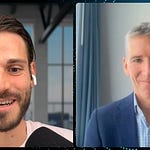Marc sat down with Stephen Messer, internet entrepreneur, inventor and investor, and founder of Collective[i], to explore how artificial intelligence is transforming corporates.
Collective[i] is a AI pioneer, using AI-driven economic models to provide businesses with predictive insights and real-time decision-making tools.
Before founding Collective[i] in 2008, Messer built and sold LinkShare, one of the world's largest affiliate marketing companies. His vision was shaped by watching AI evolve from simple expert systems to today's sophisticated neural networks.
Key Insights ⛓️💥
1. The Three-Layer AI Stack
Messer presents a compelling framework for understanding AI development:
Commodity Models: Language, image, and audio models trained on public data
Commodity + Complexity Models: Domain-specific models requiring expert knowledge (e.g., protein folding)
Proprietary Data Models: Models trained on private business data to generate unique insights
👉 This taxonomy helps executives understand where sustainable competitive advantages might actually exist in AI.
2. The LLM Reality Check
Messer argues that language models will likely be commoditized, similar to how browsers became utilities.
Current LLM capabilities are "tapping out" due to limited novel training data:
The real value comes from combining LLMs with domain-specific models
Pure LLM advice tends to be generic and unactionable
3. Economic Foundation Models as Competitive Advantage
Messer emphasizes that the real game-changer lies in economic foundation models that track and analyze real-time business transactions.
Collective[i] is pioneering this space, creating an AI that "observes" global commerce and generates actionable business insights. This includes:
Time-series awareness enables understanding of macro event impacts
Cross-company learning while maintaining privacy
Ability to make predictive decisions about inventory and routing
Integration with autonomous agents for real-time optimization
Q&A Highlights
Marc: What's the difference between training an LLM with proprietary data versus using an economic foundation model?
Stephen Messer: Unlike LLMs that lack context and time sensitivity, Collective[i]’s model can factor in real-world events, like interest rate changes or geopolitical shifts, providing business-specific insights.
Marc: How are traditional providers responding to Gen AI?
Stephen Messer: Everything we know is gone... When you get into AI, what you start to realize is every way we think about how the world functions changes. Because it's not about just collecting data anymore and processing it.
Marc: How does Collective[i] differ from traditional solutions like Salesforce?
Stephen Messer: In the Salesforce model, every customer's data is used to only analyze themselves... We're moving away from simple machine learning, regression models, etc., to deep learning, and we're learning across the entire network of our clients.
Marc: AI Agents?
Stephen Messer: AI agents will optimize supply chains, manage inventory, and respond to market changes dynamically—a vision that is feasible today, but often limited by outdated corporate infrastructures.
Curated Timestamps
[Early AI Experience] ~5:00
Began working in expert systems, eventually building and selling LinkShare.
Transitioned to neural networks with connections to Google Brain.
💵 [Data's Value] ~12:00
Middle Eastern countries are now major investors in AI.
Funding is increasingly directed toward companies like Anthropic, OpenAI, and MidJourney.
Investment sources are shifting from venture capital to sovereign wealth funds.
🔮 [Future Predictions] ~35:00
AI is expected to become an integral "family member" within the next 5 years.
Anticipated deep integration with healthcare and career management.
Focus on AI's role in preventive problem-solving.
🌐 [Blockchain Integration] ~45:00
AI will play a key role in accelerating Web3 adoption.
Legacy systems will need upgrades to support new technologies.
Emphasis on ensuring data authenticity and ownership.
Looking Ahead: What Business Leaders Need to Know 🔮
The 5-Year View
AI will become an integral part of daily business operations
Companies will need to upgrade their technology infrastructure
Those who don't adapt risk falling behind competitors
Key Action Items
Start Training Now
Invest in AI education for your team
Focus on practical applications in your industry
Build understanding at all levels of your organization
Prepare Your Infrastructure
Review current systems for AI compatibility
Consider how blockchain might integrate with your AI strategy
Focus on data quality and security
Watch Your Competition
Monitor how others in your industry use AI
Be prepared to move quickly when opportunities arise
Don't wait for perfect solutions - start experimenting now
Our Take 🎯
The most interesting thing about this interview isn't what Messer says about AI - it's what he reveals about how enterprise value will be created and destroyed in the next decade. While everyone's distracted by ChatGPT, the real revolution is happening in the boring back offices of enterprise software.
Stephen Messer: "Imagine if you could actually run an economy by having an AI optimized every single day of how business is being done."
That's not just a technology prediction - it's a complete reimagining of how business operates. And it's probably going to happen whether we're ready or not.
The Kicker 🥁
If Messer’s predictions are accurate, many companies are underestimating:
How quickly enterprise software will be disrupted
How valuable cross-company data assets will become in the future
How completely business operations will be transformed
And we're probably overestimating:
The value of standalone LLM companies
The durability of current enterprise software
The importance of proprietary data silos
The final thought: The next trillion-dollar company might not be building a better chatbot - it might be creating the economic foundation model that runs the global economy. That’s it for today!
Talk soon,
– Marc
Find our other podcasts here:
PS: Before you go, here’s how our industry OGs, vast network, research team & 50k+ B2B audience help you:
Co-publish enterprise-grade reports with us, driving traffic and boosting B2B outbound conversion rates.
Execute a multi-channel growth campaign that delivers better results than anything else in Web3's consumer space.
















